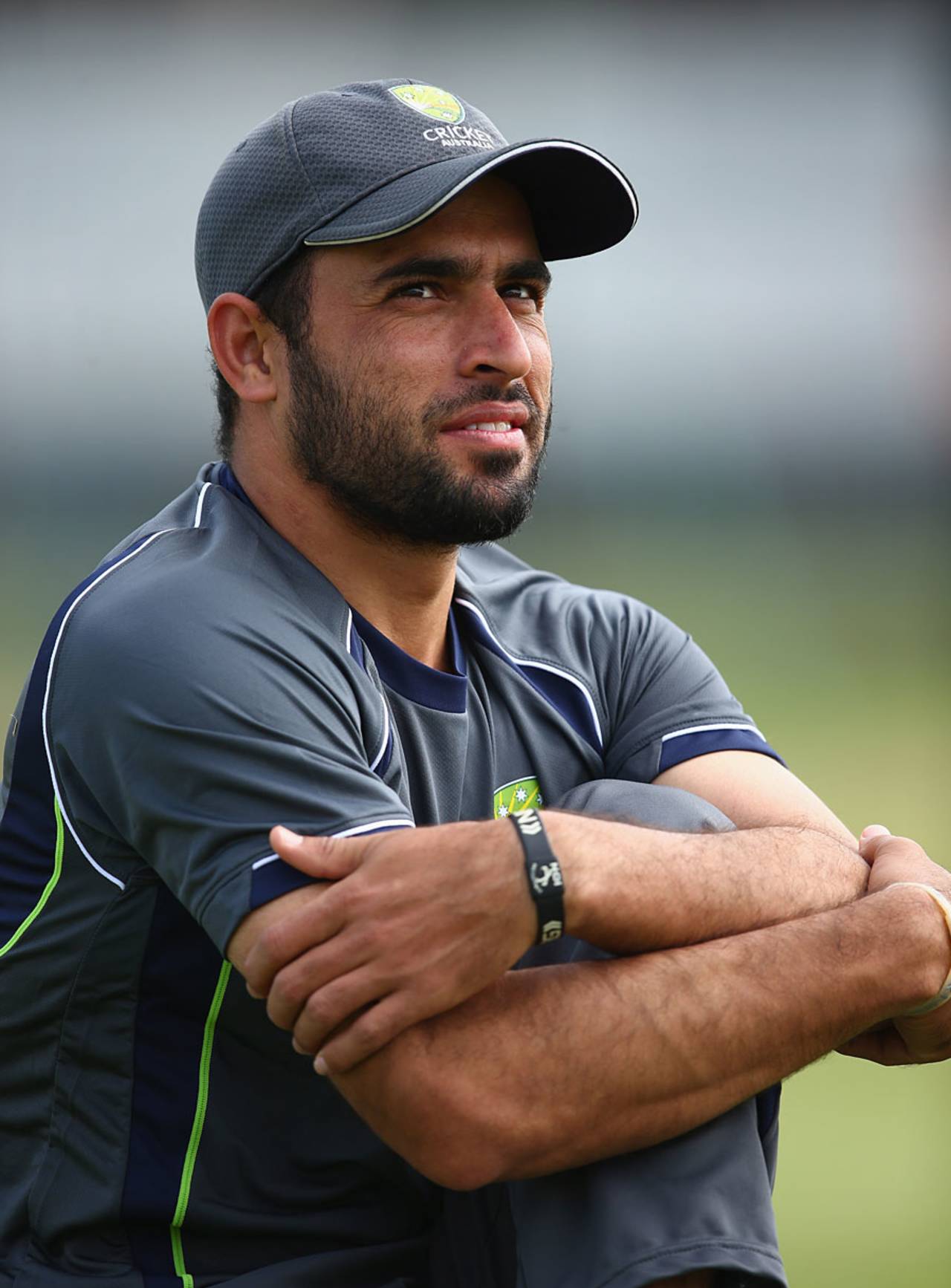It's not Fawad's fight
We tend to be too eager to saddle sportspeople with the burden of being catalysts for social change
Ahmer Naqvi
Sep 11, 2013, 4:22 PM

Fawad Ahmed: burdening the likes of him with socio-political expectations is a recipe for sporting failure • Getty Images
In 2011, when the world was swept up in the fervour of the Arab Spring(s), and before these had descended into genocides and counter-coups, there was a prevalent opinion in the western media that the advent of Facebook and Twitter had been the game-changers responsible for catalysing revolutions against dictators who had ruled for decades.
However, the prescient Malcolm Gladwell argued otherwise - he wrote that revolutions occurred before the internet, and the crucial factor in a revolution was the presence of a committed core of activists. Gladwell (and others) said that social media sites were still just tools for communication, rather than catalysts of revolution.
This mistaking of consequence with cause was brought to my mind while thinking about the backlash over Fawad Ahmed not wearing a beer sponsor's logo on his Australian uniform. Having had laws changed and procedures upended so his entry into the team could be fast-tracked, his mere decision to exercise an option provided in his contract led men like Dougie Walters and David Campese to suggest that Fawad "go home".
Perhaps if these two gentlemen had any knowledge of the dozens of Aboriginal languages in Australia, they might have heard similar sentiments being expressed towards them as well. But moving beyond the irony, what does Fawad's ascension in the team mean in a political sense?
Whenever a minority sportsperson breaks through into the spotlight, their supporters and detractors view them as symbols of political viewpoints they inevitably come to embody. Fawad's supporters see a more diverse Australian future, while his detractors see a country losing its way by bending over backwards to accommodate him.
For those in support of Fawad and others like him, there are plenty of famous examples to point to. Muhammad Ali knocking out racism with his gloves, Jesse Owens shattering the Nazi myth with his gold medals, Billie Jean King earning female athletes the respect they deserved. For each of these heroes, the narrative often tends to imply that their successes in the sporting arena played a crucial role in changing the political debate at large.
Yet, much like with Facebook and the Arab Spring, it is my instinct that we are confusing cause and effect here. There are certainly conditions that allow some sportspeople to succeed beyond the arena, but foisting such expectations on a player can be detrimental in most cases.
Consider those minority sportspeople who have failed to make an impact. England has a litany of cricketers from minority backgrounds, particularly of South Asian descent, who have failed, to varying degrees, to quite make it on the big stage. From Saj Mahmood to Ravi Bopara, Mark Ramprakash to Adil Rashid, one thing they seem to have in common is not a lack of talent but rather a lack of confidence.
But while living for three years in the UK gave me plenty of personal examples of racist and Islamophobic attitudes there, it has to be acknowledged that British society is far more accepting of minorities than its European counterparts, and that desis in Britain have become very much a part of the national fabric.
Instead, what seems to be the issue is that while sport can inspire profound changes, there is a limit to what it can achieve. To truly value the contribution of England's many immigrant-descent players, one must appreciate the difficulties they must have faced in breaking out to the extent they have.
But it seems to me (and this is in no way anything more than pseudo-science) that in order for players mired in political controversy to succeed, there needs to be a wider socio-political movement that they can be heralded as symbols of. To put it another way, a sportsperson can come to represent change, but it is probably impossible for him or her to catalyse widespread political change based solely on what they do on the field.
Take, for example, cricket between India and Pakistan, which is forever touted as bringing the peace process forward. The warm afterglow of sporting contests featuring the two countries - particularly in recent years - almost always leads to better people-to-people relations, but no number of cricket matches has ever brought peace to the region.
For a sportsperson burdened with excessive political connotations, the only way it seems they can transcend them is if they view their actions as part of a greater struggle. Billie Jean King's efforts came in the aftermath of profound social changes in the USA; Owens was standing up to a regime that had polarised the world; Ali's career coincided with the civil rights movement. Even England cricket's most successful (non-white) immigrant, Basil D'Oliveira, was buffeted by the anti-apartheid movement.
In contrast, someone like Fawad is being pushed into a political debate without really having a corresponding political ideology or movement to represent. At the moment this is very much a storm in a tea cup, as Cricket Australia has unequivocally stood by their player, and the dissent is mostly confined to Twitter. But with the new government in Australia certain to be controversial on immigration policies, Fawad could conceivably be asked to shoulder a level of symbolism that he could very well wilt under, both as a player and as a person. I dearly hope that my thesis here is proven wrong, and the likes of Fawad, Usman Khawaja and others make a mark on both their sport and their societies. But it seems that burdening players with unrealistic political and social expectations is the surest way of calling forth their sporting demise.
Ahmer Naqvi is a journalist, writer and teacher. He writes on cricket for various publications, and co-hosts the online cricket show Pace is Pace Yaar. He tweets here